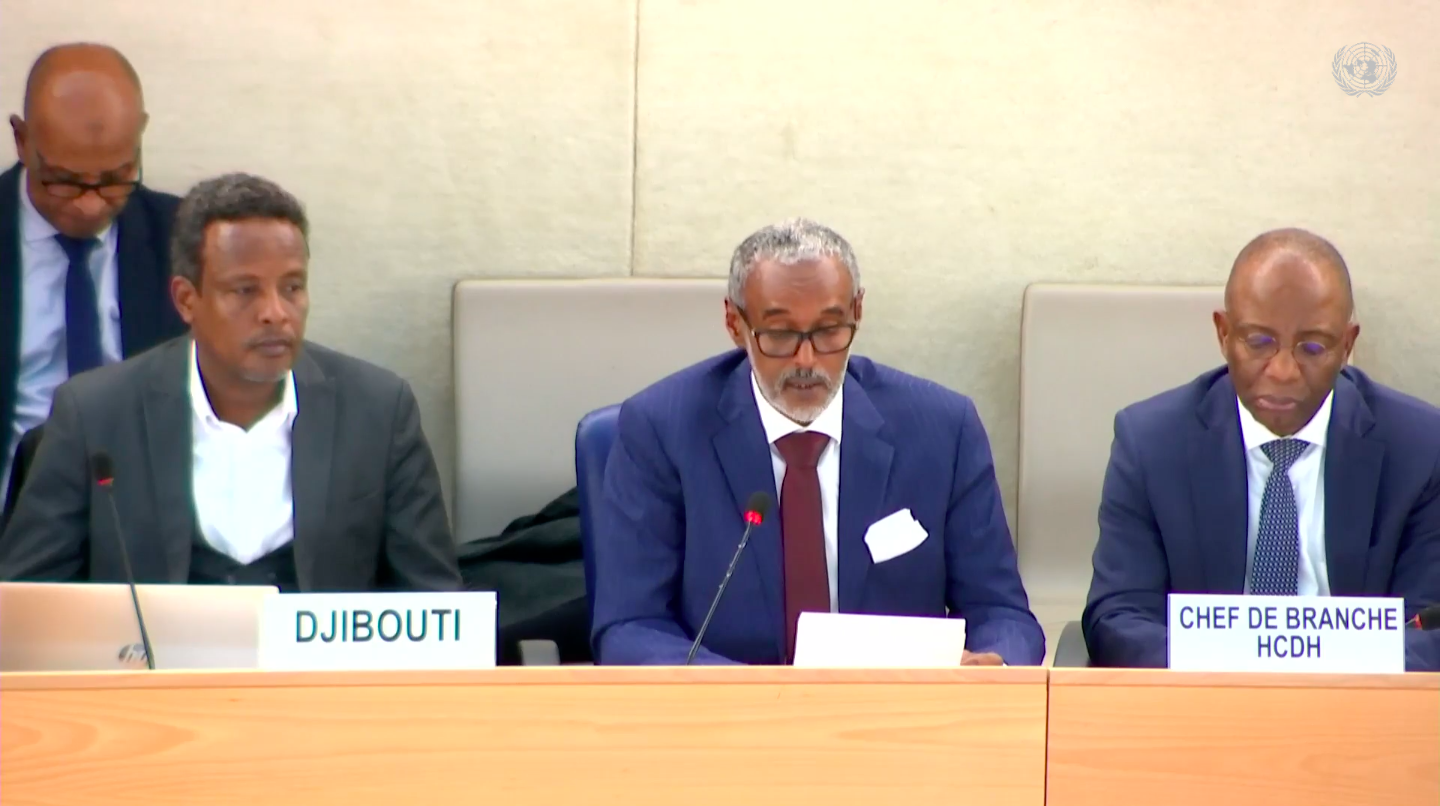November 14, 2023

The Djibouti delegation during the 4th cycle of its Universal Periodic Review at the UN Human Rights Council © UN Web TV.
On November 9, 2023, Djibouti’s human rights record was examined before the UN Human Rights Council (HRC) during the country’s fourth Universal Periodic Review (UPR). The UPR is a peer-review mechanism by which UN Member States make recommendations to the country under review on how to improve its human rights record in light of the country’s international obligations.
Djibouti is then required to notify the HRC of the recommendations it wishes to accept and those it rejects during the upcoming 55th session of the HRC in February-April 2024. Ahead of the review, MENA Rights Group submitted a shadow report, containing a list of recommendations, which was circulated among the reviewing States. MENA Rights Group presented the findings of the report during a pre-session held by the Geneva-based organisation UPR-info on September 1, 2023.
Right to freedom of expression and press freedom
During the UPR session, Djibouti’s Minister of Justice, Mr Ali Hassan Bahdon, claimed that there are institutional guarantees for press freedom and freedom of expression in the country, stating that the domestic legislation guarantees journalists’ independence.
Yet, while the right to freedom of expression is protected under the Constitution, it remains extremely restricted by law and in practice. The criminalization of defamation and public slander is a cause of concern, as well as the lack of independent media in the country.
In light of this situation, 14 countries including Zambia and Ghana have issued recommendations for Djibouti to protect the right to freedom of expression. Other countries made specific recommendations on the need to strengthen press freedom.
Belgium recommended that Djibouti “revises the Freedom of Communication Law and the Penal Code to eliminate provisions that restrict freedoms of expression and association, including by decriminalizing defamation and removing restrictions on the creation of media based on nationality and age”. In a similar vein, Estonia recommended that Djibouti “decriminalizes defamation and include it in the Civil Code”.
Concerning the application of laws affecting freedom of expression, the United States recommended that Djibouti “does not prosecute, detain, or refuse entry to the country to people exercising their right to freedom of expression”.
Rights to freedoms of association and peaceful assembly
During the session, Djibouti’s delegation stated that there is no hindrance to the rights to freedoms of association and peaceful assembly in the country. They also claimed to be working on a new legislation pertaining to freedoms of association and peaceful assembly, with the goal of improving the current legal framework.
According to the delegation, this new law should prevent the risk for associations to be funded by “terrorist organisations”. This particular point raises concerns as the definition of terrorism is vague and stated in broadly worded provisions in Djibouti's domestic law.
Furthermore, the current law on freedoms of peaceful assembly and association is very restrictive and therefore many local NGOs working on politically sensitive topics cannot operate freely in the country.
Djibouti received seven recommendations on the rights to freedom of association and peaceful assembly. Canada for example recommended that Djibouti enacts “legislation to guarantee freedom of expression, association and peaceful assembly, and to protect all individuals from reprisals”. Ireland recommended that Djibouti ensures that the legal framework providing protection of the rights of freedoms of association and peaceful assembly “is compatible with international standards and enables full and free participation in political life”.
National Human Rights Commission
Djibouti’s delegation talked in length about the National Human Rights Commission, the country’s National Human Rights Institution (NHRI), and stated that its funding and functioning has been strengthened since a legislation from 2014. They also mentioned that they wish to get an A accreditation from the Sub-Committee on Accreditation of the Global Alliance of NHRIs (GANHRI), which they have yet to receive.
The delegation finally claimed that a new legislation is being drafted, which will strengthen the independence of the NHRI by having its members elected by “civil society” and by strengthening the immunity of its members. This law will have to be voted upon by the members of the Parliament.
The enabling law currently in force has serious shortcomings, particularly with regards to executive control over the appointment process, with members still appointed by the executive. The independence of the NHRI is also limited because their reports need to be approved by the government before being published.
Djibouti has gotten six recommendations regarding its NHRI. Gambia recommended that Djibouti “strengthens its National Human Rights Commission to be in compliance with the Paris Principle”. Additionally, the Netherlands recommended that Djibouti strengthens its NHRI “including through adequate resourcing and guaranteeing full operational independence”.
In July 2019, MENA Rights Group submitted a report to the Sub-Committee on Accreditation of the GANHRI, which found that Djibouti's NHRI did not fully comply with the Paris Principles and could not be considered as independent, impartial and effective.
Next steps
Djibouti has until the 55th session of the Human Rights Council – which will be held from February 26 to April 5, 2024 – to provide responses to the recommendations it received during its UPR. Djibouti will commit itself to implementing accepted recommendations ahead of the country’s 5th cycle.
We urge Djibouti to accept the recommendations made by UN Member States, especially those pertaining to the right to freedoms of expression, association and peaceful assembly, and the ones regarding the independence of the NHRI.






